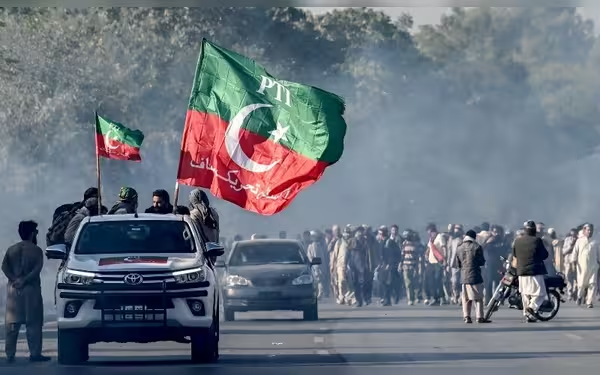Sunday, December 22, 2024 02:47 PM
PTI Activists Mobilize in Punjab for Islamabad Protest
- PTI activists navigate unconventional routes to reach D-Chowk.
- Hammad Azhar leads party members while avoiding police detection.
- Protest demands include Imran Khan's release and restoration of mandate.
 Image Credits: dawn
Image Credits: dawnPTI activists from Punjab mobilize for a protest in Islamabad, demanding Imran Khan's release and restoration of the stolen mandate.
In recent days, the political landscape in Pakistan has been marked by significant unrest, particularly involving the Pakistan Tehreek-i-Insaf (PTI) party. As tensions escalated in Islamabad, PTI leaders and activists from across Punjab embarked on a determined journey to reinforce their presence in the capital. This movement comes in response to Imran Khan's "final call" for protest, which has mobilized party members to navigate through unconventional routes to reach D-Chowk, the epicenter of their demonstration.
On the second day of the protest, PTI activists displayed remarkable resilience and ingenuity. Many chose to travel in isolated vehicles, deliberately avoiding identification as party members. Some even took the extraordinary step of crossing rivers in makeshift ferries to evade police scrutiny. Hammad Azhar, the PTI Punjab president, who has been operating under the radar, was seen leading a caravan of party legislators and supporters. His tweet, "Where there is a will, there is a way," encapsulated the spirit of determination among the activists.
As the journey unfolded, Azhar advised his fellow party members to refrain from using social media until they reached their destination, emphasizing the need for discretion. He encouraged those still in their hometowns to keep their vehicles separate from the main caravans and to navigate through police barricades like ordinary citizens. This strategy aimed to minimize the risk of detection and arrest by law enforcement.
Despite the heightened security measures in Lahore and other major cities, PTI activists continued to find ways to slip through police checkpoints. Sheikh Imtiaz Mahmood, the PTI Lahore president, reported that he and other leaders managed to escape from Lahore using side roads, maintaining a safe distance between their vehicles. However, many party workers expressed their frustration over the lack of transportation, relying on their leaders for assistance to reach Islamabad.
Reports indicated that some PTI members resorted to boarding trains bound for Rawalpindi, only to face arrests at the Lahore railway station due to prior intelligence received by security agencies. Shaukat Basra, the PTI Punjab information secretary, stated that party members were instructed to arrive in Islamabad by midnight, highlighting the urgency of their mission.
The PTI's protest is centered around three key demands: the release of Imran Khan and other political prisoners, the restoration of the "stolen mandate," and the reversal of the 26th constitutional amendment to uphold the rule of law. As the party mobilizes its supporters, it is clear that the political climate in Pakistan remains charged with tension and uncertainty.
The ongoing protests by PTI reflect a broader struggle for political representation and justice in Pakistan. As activists navigate through challenges and risks, their determination underscores the significance of civic engagement in shaping the nation’s future. The unfolding events serve as a reminder of the power of collective action and the lengths to which individuals will go to advocate for their beliefs. The situation remains fluid, and the coming days will be crucial in determining the trajectory of this political movement.













